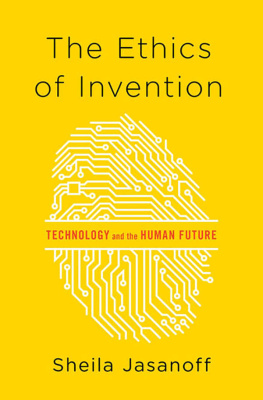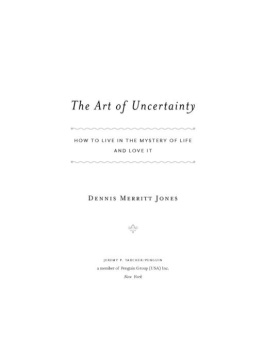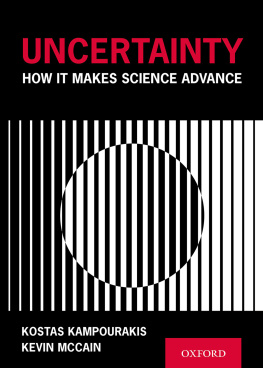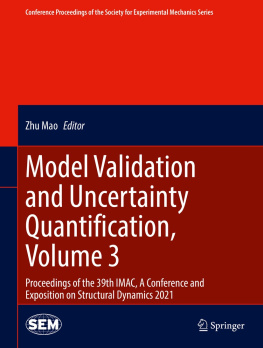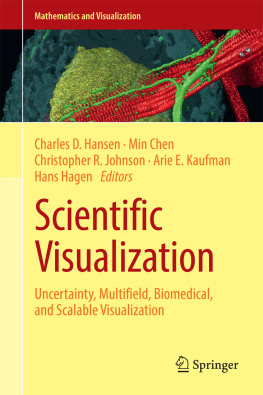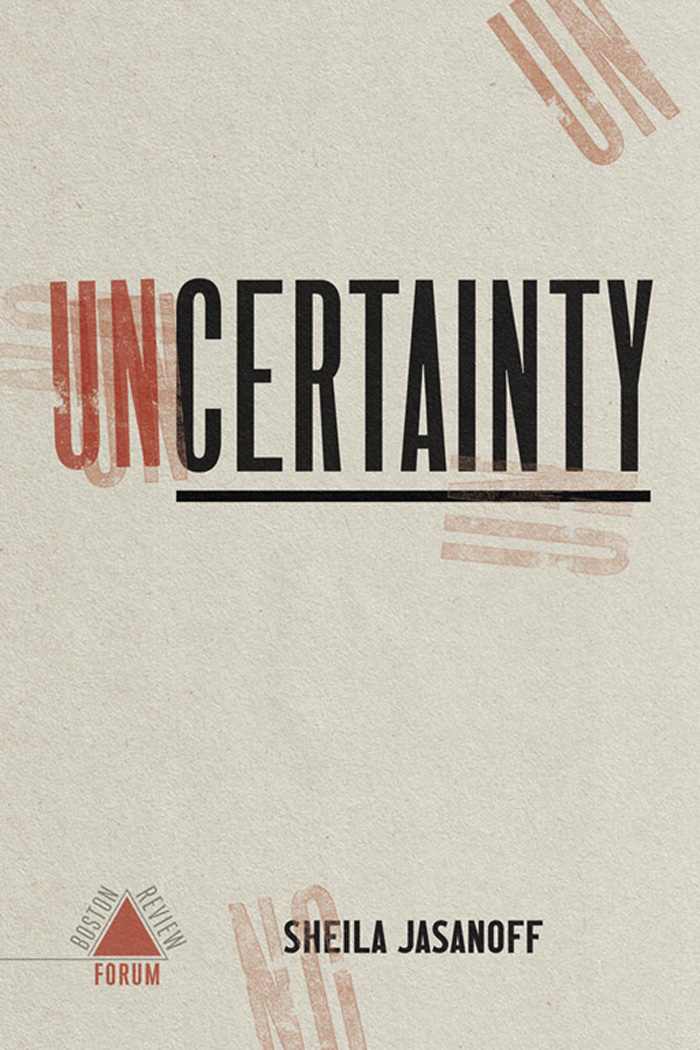CONTENTS
Guide
UNCERTAINTY
Editors-in-Chief Deborah Chasman & Joshua Cohen
Managing Editor and Arts Editor Adam McGee
Senior Editor Matt Lord
Engagement Editor Rosie Gillies
Manuscript and ProductionEditor Hannah Liberman
Contributing Editors Adom Getachew, Walter Johnson, Amy Kapczynski, Robin D. G. Kelley, & Lenore Palladino
Contributing Arts Editor Ed Pavli & Ivelisse Rodriguez
Black Voices in the Public Sphere Fellows Nia T. Evans & Nate File
Editorial Assistants Emma Lower & Esther Omole
Marketing and Development Manager Dan Manchon
Special Projects Manager Mara Clara Cobo
Finance Manager Anthony DeMusis III
Printer Sheridan PA
Board of Advisors Derek Schrier (Chair), Archon Fung, Deborah Fung, Richard M. Locke, Jeff Mayersohn, Jennifer Moses, Scott Nielsen, Robert Pollin, Rob Reich, Hiram Samel, Kim Malone Scott
Interior Graphic Design Zak Jensen & Alex Camlin
Cover Design Alex Camlin
Uncertainty is Boston Review Forum 20 (46.4)
Caley Horans essay is adapted with permission from Insurance Era: Risk, Governance, and the Privatization of Security in Postwar America by Caley Horan, published by The University of Chicago Press. 2021 by The University of Chicago. All rights reserved.
To become a member, visit
bostonreview.net/membership/
For questions about donations and major gifts,
contact Dan Manchon,
For questions about memberships, call 877-406-2443
or email .
Boston Review
PO Box 390568
Cambridge, ma 02139
issn : 0734-2306 / isbn : 978-1-946511-66-9
Authors retain copyright of their own work.
2021, Boston Critic, Inc.
d_r0
EDITORS NOTE
Joshua Cohen & Deborah Chasman
nearly two years into a global pandemic, uncertainty has profoundly unsettled both our personal and political lives. Some of its sources are epistemic: When should schools reopen for in-person learning? How long will vaccine immunity last? Do rising prices threaten economic recovery? Others are sharply existential: How will I pay rent next month? Can I travel safely? Will I see my loved one again? At perhaps no other moment in the twenty-first century has there been such widespread unease about what the future holds.
What does this crisis of certainty mean for society? As enduring debates over pandemic policy have made clear, uncertainty is particularly consequential where it intersects with political power. Leading this issue's forum, Sheila Jasanoff, pioneering scholar of science and technology studies, argues that public policy could benefit from a much more serious acknowledgment of uncertainty. Her essay begins with the striking failures of the U.S. pandemic response, despite decades of warning from public health experts that such a crisis was inevitable. The problem, Jasanoff contends, was to overestimate the certainty of our predictions and our capacity for control. In place of the hubris of technocratic expertise, Jasanoff calls for technologies of humilityinstitutional mechanisms, including greater citizen participation, for incorporating a wider range of experience and views in our schemes of democratic governance. Respondents to Jasanoff consider other causes of pandemic mismanagement and ask whether humility is the best response.
Other contributors extend the discussion of uncertainty beyond COVID-19. Uncertainty not only shapes what we do, Oded Naaman notes, but also how we feel, and philosophy offers a fount of wisdom when we imagine the worst. Nor is uncertainty necessarily paralyzing. As Simon Torracinta observes, the late social scientist Albert O. Hirschman saw it as an opportunity. Perfect planning is impossible, he thought, but that shouldn't stop us from trying to build a more just world and learning from our collective experience. In the face of the immense challenges before usand uncertainty about how best to solve themwe could do far worse than share his bias for hope.
FORUM
HUMILITY IN PANDEMIC TIMES
Sheila Jasanoff
the covid -19 pandemic has confounded the world's expectations at every turn. It began in surprise, continued with chaos, and devolved into conspiracy theories. From a policy standpoint, it gave the lie to our prepandemic imaginations of order and control. Public health experts, after all, had warned of an outbreak for decades. But despite its prominence among the grand global challenges that successive U.S. presidents were advised to take seriously, it still caught this nation and many others flatfooted. Nineteen months into the pandemic and counting, the balance sheet of losses and gains in the United States leans negative across public health, the economy, and democratic politics. How can we begin to make sense of a widely predicted crisis that, by late October 2021, had carried off nearly 5 million lives worldwide, stalled economies, and placed unprecedented strains on social ties and personal liberty?
The mistake, I argue, was to overestimate the certainty of our predictions and our capacity for control. Prediction as a policy tool focuses on identifying chains of causation and assessing their likelihood before bad things happen. That approach has scored great successes, most notably in alerting the world to the threat of climate change well before droughts, wildfires, and record-breaking storms showed ordinary people that weather was turning calamitous. Prediction, however, also falters under the weight of its own ambitions. Disasters happen, and hindsight often reveals overconfidence in the pictures of nature and society on which predictions were based. The makers of thalidomide and diethylstilbestrol did not test for side effects on children born to pregnant women. NASA launched the Challenger without fully analyzing data on the performance of the rocket's O-ring seals at unusually cold temperatures. Promoters of biofuels failed to calculate the effects of incentivizing these crops on the production of essential food grains. The Fukushima Daiichi planners did not count on a 9.0-magnitude earthquake or a fifteen-meter tsunami at the site of the nuclear power plant.
To counter prediction's problems of complexity, ignorance, and uncertainty, the policy world recommends precaution. Commonly traced to German environmental policy of the early 1970s, the precautionary principleor Vorsorgeprinzipinstructs public authorities to plan ahead and act to prevent serious harm to humans and the environment even in the absence of full scientific certainty. This principle has been widely adopted in international agreements such as the 1992 Rio Declaration on Environment and Development and the European Union's Maastricht Treaty of the same year. Yet precaution remains deeply controversial. Critics frequently dismiss it as a recipe for inaction and stagnation. A notable U.S. example is Cass Sunstein's scathing denunciation of Europe's reliance on precaution as fear-driven, paralyzing, and self-blinding.
Advocates of precaution insist that the principle does not stand for passivity or resignation. It was developed precisely to enable and justify prudent forward movement to serve the common good, even when the consequences of acting cannot be completely known. Still, an asymmetry remains that works in favor of prediction and discourages precaution. It is easy to assert our calculative power and deploy our technologies, but less easy to say when to hold back or how not to act. Can one operationalize the precautionary mindset as a positive alternative to the known failures of prediction?


